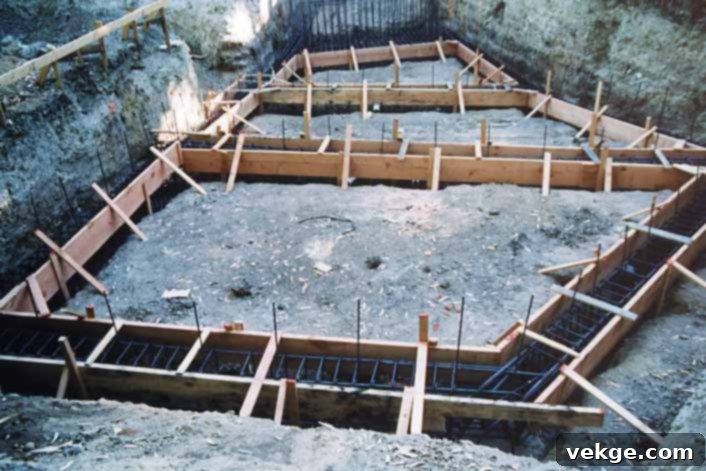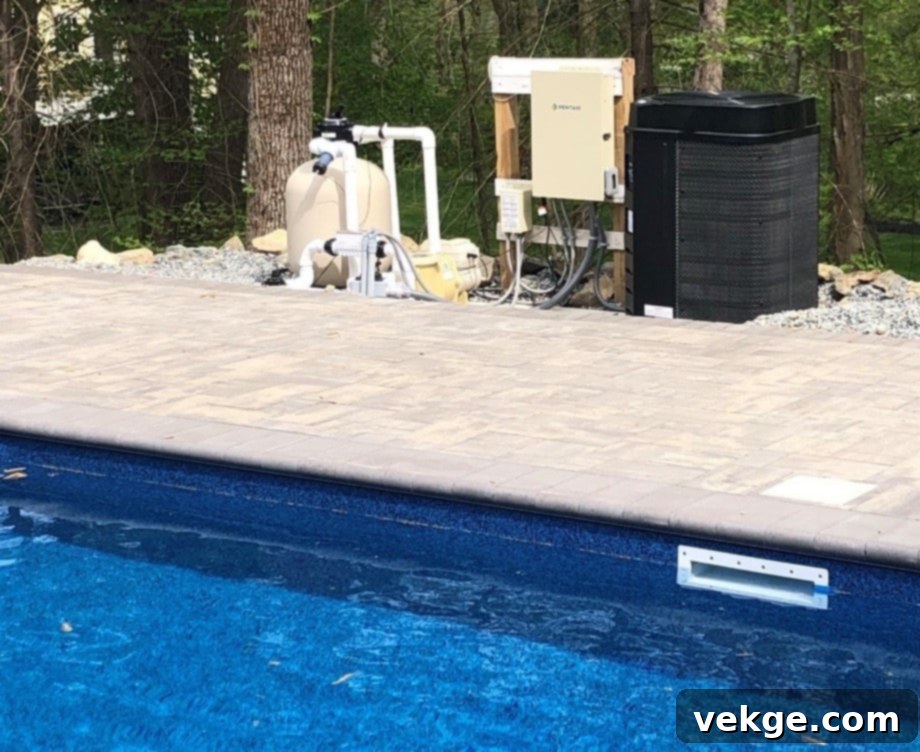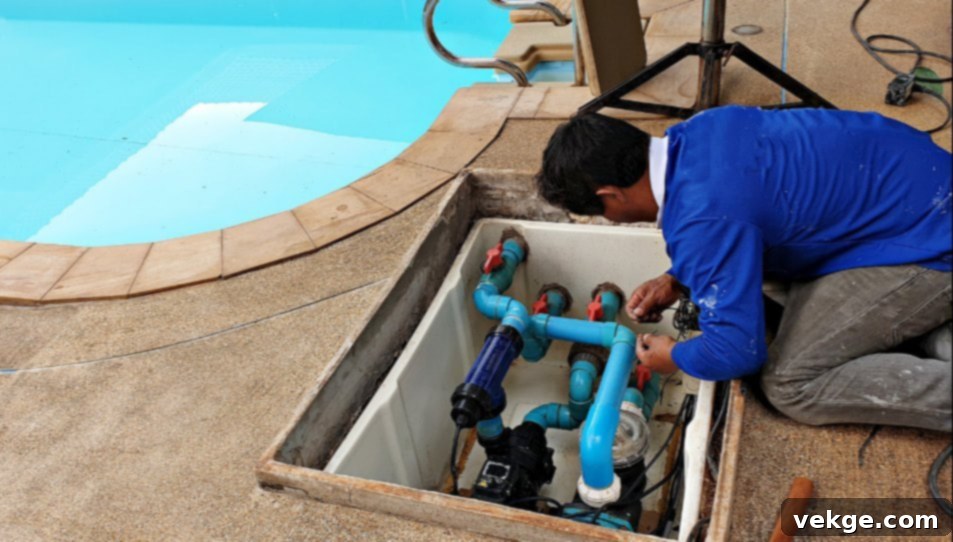Maximize Your Pool’s Lifespan: A Comprehensive Guide to Maintenance and Component Longevity
Imagine stepping into your own private haven, a shimmering expanse of cool, inviting water right in your backyard. Owning a swimming pool is more than just a luxury; it’s an investment in countless memories, a personal escape from daily stress, and the ultimate antidote to summer’s heat. This idyllic vision, however, comes with a commitment: understanding the intricate ecosystem that keeps your pool running smoothly. Like any significant investment, your pool requires diligent maintenance, timely repairs, and a foundational knowledge of its various components and their expected lifespans.
This comprehensive guide will help you navigate the common malfunctions pool owners encounter, detail the typical longevity of key pool components, and provide actionable insights to ensure your backyard oasis remains a source of joy and relaxation for many years, even decades, to come. By understanding what to expect from your pool’s vital parts, you can proactively plan for maintenance and repairs, ultimately saving time, money, and headaches.
The Enduring Core: Pool Foundation and Surface Integrity

The structural integrity of your swimming pool is its backbone, dictating its overall durability and longevity. The type of pool construction significantly influences its expected lifespan and maintenance requirements.
Concrete and Gunite Pools: Built to Last
Concrete or gunite pools are renowned for their exceptional durability and customizability. These robust structures can often last upwards of 50 years, and with meticulous care, even longer. Their strength lies in their reinforced concrete shell, which is then plastered, tiled, or finished with an aggregate material. However, even these titans of durability aren’t entirely immune to wear and tear. Over time, the surface can develop hairline cracks, stains, or general deterioration, necessitating a resurfacing every 10 to 15 years. Resurfacing involves applying a fresh layer of plaster, pebble tec, or tile, which not only revitalizes the pool’s appearance but also seals and protects the underlying structure. Proper water chemistry is paramount for concrete pools, as imbalances can quickly degrade the plaster surface.
Vinyl Liner Pools: Versatility and Value
Vinyl liner pools offer a more cost-effective entry point into pool ownership, known for their smoother surface and a wide array of design options. While the underlying frame of these pools, often made of steel or polymer, can last for several decades if properly maintained and protected from corrosion, the vinyl liner itself requires more frequent attention. Liner tears, punctures from sharp objects, or stretching and fading due to UV exposure and chemical imbalances are common issues. Though minor damage can often be patched temporarily, a complete liner installation is typically recommended every 5 to 9 years. The thickness of the liner (measured in mil) can also impact its lifespan, with thicker liners generally offering greater durability.
Fiberglass Pools: Low Maintenance, High Resistance
Fiberglass pools strike a favorable balance between maintenance and longevity. Constructed from a pre-formed fiberglass shell, these pools are celebrated for their smooth, non-porous surface, which naturally resists algae growth and makes cleaning considerably easier. This inherent resistance contributes to lower chemical usage and less frequent cleaning. A well-maintained fiberglass pool shell can last an impressive 20 to 30 years or more. While highly durable, they can occasionally face issues like “spider cracks” (small, superficial cracks in the gel coat) or fading of the gel coat over extended periods. Rarely, osmosis blisters can form if manufacturing defects are present, but these are often covered by manufacturer warranties.
The Lifeblood of Your Pool: Keeping the Water Clean and Clear
Maintaining crystal-clear, healthy pool water is non-negotiable for a pleasant swimming experience and the longevity of your pool. The filtration system is the unsung hero, constantly working to remove impurities and debris.
Pool Filters: Your Water’s Guardian
There are three primary types of pool filters, each with its own maintenance schedule and expected lifespan for its media:
- Sand Filters: Popular for their simplicity and robust performance, sand filters work by trapping debris within a bed of specialized filter sand. The sand typically needs to be replaced roughly every 3 to 5 years, depending on pool usage, the bather load, and the effectiveness of regular backwashing. Over time, sand grains become smooth and less effective at trapping particles, or they can “channel,” allowing water to bypass filtration.
- Cartridge Filters: These filters utilize large, pleated fabric cartridges to trap much finer particles than sand filters. Cartridges require periodic cleaning (hosing down) and typically need replacement every 2 to 3 years, or more frequently if the pool experiences heavy use or if the water is particularly dirty. Proper cleaning and avoiding harsh chemicals can extend their life.
- D.E. (Diatomaceous Earth) Filters: Offering the highest level of filtration, D.E. filters use a fine powder (diatomaceous earth) coated onto fabric grids to capture even microscopic particles. This superior filtration comes with more intricate maintenance, including periodic backwashing and recharging with new D.E. powder. The D.E. grids themselves usually need replacement every 5 to 10 years, as they can tear or become clogged beyond effective cleaning.
The Essential Organs: Pumps and Heaters

The pump and heater are vital components, often referred to as the heart and blood of your pool’s circulation system. They work in tandem to keep water moving and at a comfortable temperature.
Pool Pumps: The Heartbeat of Your System
Your pool’s pump is responsible for circulating water through the filter, heater, and any other sanitation equipment. The typical lifespan of a pool pump ranges from 8 to 12 years, though this can vary significantly based on usage patterns, environmental conditions, and proper maintenance. Variable-speed pumps, while a higher initial investment, often last longer due to their ability to run at lower, less stressful RPMs, and they offer significant energy savings. Common issues include motor failure, seal leaks, or clogged impellers. Regular cleaning of the pump basket and ensuring proper voltage can extend the pump’s life.
Pool Heaters: Extending Your Swim Season
Pool heaters, whether gas, electric, heat pump, or solar, allow you to extend your swimming season and enjoy your pool even on cooler days. Their lifespan generally mirrors that of pumps, falling into the 8 to 12-year range. However, heaters can be more susceptible to issues like mineral buildup, corrosion from unbalanced water chemistry, or problems with pilot lights and igniters in gas heaters. Regular professional inspection, especially before the swimming season, can identify potential problems early and prolong the heater’s operational life. Descaling and cleaning internal components are also crucial for regions with hard water.
The Hidden Network: Plumbing and Skimmers
While often out of sight, your pool’s plumbing and skimmers are critical for efficient water flow and surface cleanliness. These components quietly maintain the pool’s ecosystem.
Plumbing: The Veins of Your Pool
The PVC piping system that connects all your pool equipment is remarkably durable, often lasting as long as the pool structure itself, provided it was installed correctly. However, issues such as leaks from shifting ground, root intrusion, or degradation from prolonged exposure to harsh chemicals can occur. Early detection of leaks, often indicated by a dropping water level, is crucial. Addressing these issues promptly can prevent costly structural damage or significant water loss. Regular inspections for visible cracks or damp spots around equipment pads are recommended.
Skimmers: Your First Line of Defense
Skimmers are the pool’s primary surface cleaners, drawing in debris like leaves, insects, and oils before they sink to the bottom. Made of durable plastic or reinforced concrete, skimmers typically last for decades, often as long as the pool itself. Their main vulnerabilities are cracking due to freeze-thaw cycles (if not properly winterized) or impact damage. Keeping the skimmer basket clean prevents clogs that can strain your pump, ensuring efficient operation and longevity of the entire system.
Proactive Care: Essential Pool Repairs and Maintenance Strategies

While the durability of modern pool components is impressive, consistent and intelligent maintenance is the absolute cornerstone of longevity. Neglecting routine tasks can accelerate wear and tear, leading to premature failures and expensive repairs. A proactive approach is always more cost-effective than a reactive one.
Routine Maintenance for Extended Lifespan
- Daily & Weekly Checks: Regularly skim the surface, empty skimmer and pump baskets, brush pool walls and floor, and vacuum as needed. This prevents debris from breaking down and impacting water chemistry or clogging equipment.
- Chemical Balancing: Testing and balancing your pool’s chemicals (pH, alkalinity, calcium hardness, sanitizer levels) is perhaps the most critical task. Imbalanced water can corrode equipment, degrade pool surfaces, and create an unhealthy swimming environment.
- Filter Cleaning: Backwash sand and D.E. filters, and clean cartridge filters according to manufacturer recommendations. A dirty filter significantly reduces efficiency and strains your pump.
- Winterization & Opening: For pools in colder climates, proper winterization prevents freezing damage to plumbing and equipment. Conversely, a professional opening ensures all systems are checked and running optimally for the season.
Preventative Measures and Proactive Replacements
For components with a definitive lifespan, such as vinyl liners or filter media, proactive replacement rather than waiting for failure can save significant time and money. A worn-out liner can lead to leaks and structural damage, while old filter sand reduces filtration efficiency, putting stress on other equipment. Schedule regular professional inspections, ideally annually, to catch small issues before they escalate. A professional can identify minor leaks, inspect electrical connections, and assess the overall health of your equipment.
DIY vs. Professional Pool Repairs
For the avid DIY enthusiast, many minor pool repairs and maintenance tasks are satisfying and cost-effective to undertake. Patching a small tear in a vinyl liner, replacing a cartridge filter, cleaning the pump basket, or even basic chemical balancing are all within the scope of a handy homeowner. Numerous online resources and local pool supply stores offer guidance and products for these tasks.
However, when it comes to more complex or critical issues, calling in the professionals is not merely advisable but essential. This includes:
- Major Leaks: Especially those in the pool’s structure or underground plumbing, which require specialized detection equipment and repair techniques.
- Equipment Malfunctions: Issues with complex electrical components of pumps, heaters, or automation systems should be handled by licensed technicians to ensure safety and proper functionality.
- Structural Repairs: Cracks in concrete, significant resurfacing, or frame repairs for vinyl pools demand expertise and specialized tools.
- Gas Heater Repairs: These involve gas lines and combustion, posing safety risks if not handled by a certified professional.
Attempting complex repairs without proper knowledge and tools can lead to further damage, void warranties, and potentially create dangerous situations.
The Bottom Line: Investing in Your Pool’s Future
A swimming pool represents a substantial investment in your home’s value and your family’s quality of life. Understanding the common issues that can arise and the expected lifespan of each component of your pool is invaluable for effective budgeting, proactive maintenance planning, and stress-free ownership. By embracing a routine of diligent care and knowing when to call in the experts, you empower yourself to keep your pool in peak condition.
With proper care and attention, your swimming pool can continue to be a cherished source of relaxation, fun, and entertainment for many years, even decades. Remember, the longevity and enjoyment derived from your pool are directly proportional to the care and attention it receives. So, dive into pool maintenance with the same enthusiasm you have for swimming, and truly maximize the life and joy of your personal backyard oasis!